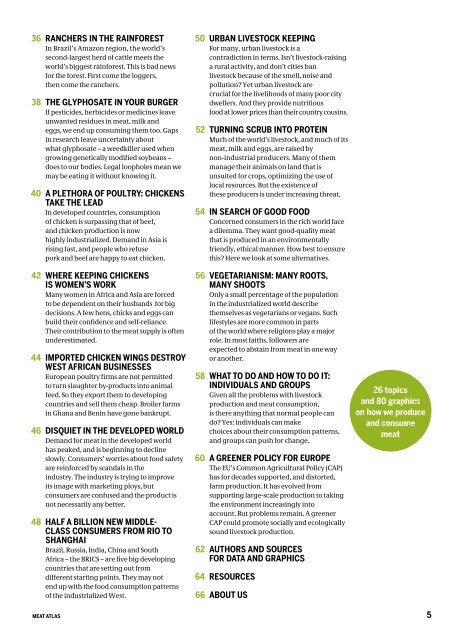1jjtwKx
1jjtwKx
1jjtwKx
Create successful ePaper yourself
Turn your PDF publications into a flip-book with our unique Google optimized e-Paper software.
36384042444648RANCHERS IN THE RAINFORESTIn Brazil’s Amazon region, the world’ssecond-largest herd of cattle meets theworld’s biggest rainforest. This is bad newsfor the forest. First come the loggers,then come the ranchers.THE GLYPHOSATE IN YOUR BURGERIf pesticides, herbicides or medicines leaveunwanted residues in meat, milk andeggs, we end up consuming them too. Gapsin research leave uncertainty aboutwhat glyphosate – a weedkiller used whengrowing genetically modified soybeans –does to our bodies. Legal loopholes mean wemay be eating it without knowing it.A PLETHORA OF POULTRY: CHICKENSTAKE THE LEADIn developed countries, consumptionof chicken is surpassing that of beef,and chicken production is nowhighly industrialized. Demand in Asia isrising fast, and people who refusepork and beef are happy to eat chicken.WHERE KEEPING CHICKENSIS WOMEN’S WORKMany women in Africa and Asia are forcedto be dependent on their husbands for bigdecisions. A few hens, chicks and eggs canbuild their confidence and self-reliance.Their contribution to the meat supply is oftenunderestimated.IMPORTED CHICKEN WINGS DESTROYWEST AFRICAN BUSINESSESEuropean poultry firms are not permittedto turn slaughter by-products into animalfeed. So they export them to developingcountries and sell them cheap. Broiler farmsin Ghana and Benin have gone bankrupt.DISQUIET IN THE DEVELOPED WORLDDemand for meat in the developed worldhas peaked, and is beginning to declineslowly. Consumers’ worries about food safetyare reinforced by scandals in theindustry. The industry is trying to improveits image with marketing ploys, butconsumers are confused and the product isnot necessarily any better.HALF A BILLION NEW MIDDLE-CLASS CONSUMERS FROM RIO TOSHANGHAIBrazil, Russia, India, China and SouthAfrica – the BRICS – are five big developingcountries that are setting out fromdifferent starting points. They may notend up with the food consumption patternsof the industrialized West.MEAT ATLAS505254565860626466URBAN LIVESTOCK KEEPINGFor many, urban livestock is acontradiction in terms. Isn’t livestock-raisinga rural activity, and don’t cities banlivestock because of the smell, noise andpollution? Yet urban livestock arecrucial for the livelihoods of many poor citydwellers. And they provide nutritiousfood at lower prices than their country cousins.TURNING SCRUB INTO PROTEINMuch of the world’s livestock, and much of itsmeat, milk and eggs, are raised bynon-industrial producers. Many of themmanage their animals on land that isunsuited for crops, optimizing the use oflocal resources. But the existence ofthese producers is under increasing threat.IN SEARCH OF GOOD FOODConcerned consumers in the rich world facea dilemma. They want good-quality meatthat is produced in an environmentallyfriendly, ethical manner. How best to ensurethis? Here we look at some alternatives.VEGETARIANISM: MANY ROOTS,MANY SHOOTSOnly a small percentage of the populationin the industrialized world describethemselves as vegetarians or vegans. Suchlifestyles are more common in partsof the world where religions play a majorrole. In most faiths, followers areexpected to abstain from meat in one wayor another.WHAT TO DO AND HOW TO DO IT:INDIVIDUALS AND GROUPSGiven all the problems with livestockproduction and meat consumption,is there anything that normal people cando? Yes: individuals can makechoices about their consumption patterns,and groups can push for change.A GREENER POLICY FOR EUROPEThe EU’s Common Agricultural Policy (CAP)has for decades supported, and distorted,farm production. It has evolved fromsupporting large-scale production to takingthe environment increasingly intoaccount. But problems remain. A greenerCAP could promote socially and ecologicallysound livestock production.AUTHORS AND SOURCESFOR DATA AND GRAPHICSRESOURCESAbout US26 topicsand 80 graphicson how we produceand consumemeat5


